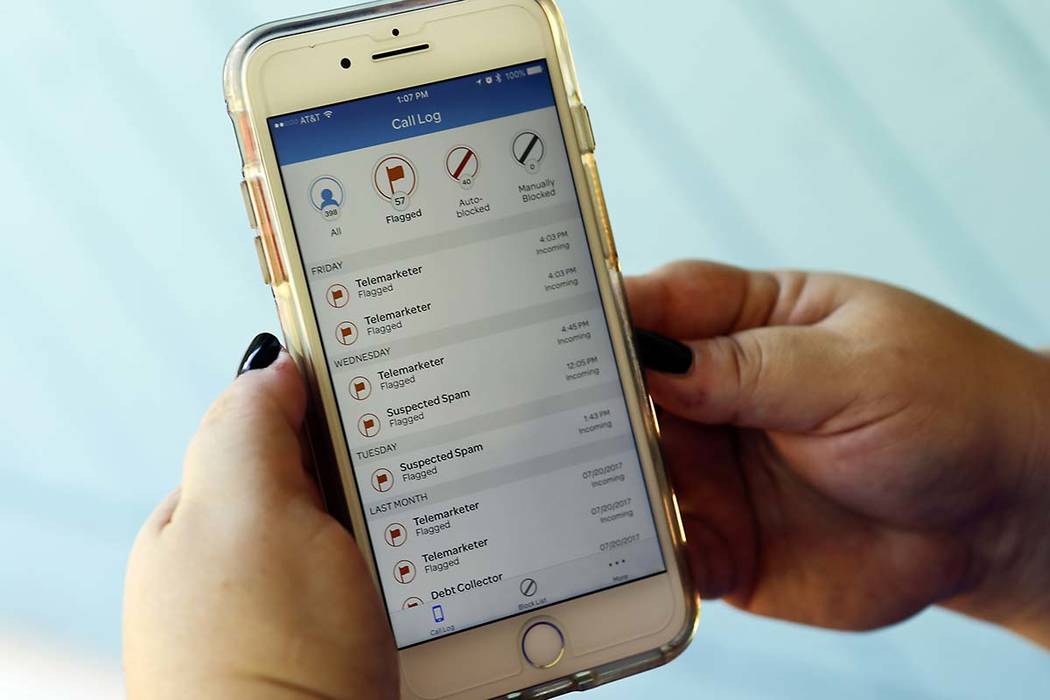Phone companies get new tools to fight robocalls
NEW YORK — Federal regulators voted Thursday to give phone companies the right to block unwanted calls without getting customers’ permission first.
The Federal Communications Commission’s move could make call-blocking widespread and help consumers dodge annoying robocalls, which have exploded into a problem that pesters Americans on the level of billions of calls a month.
One caveat: Phone companies don’t actually have to do anything, and they could start charging you if they do — just as they now charge for some caller ID features and other extras. The FCC expects phone companies to offer these tools for free, but it doesn’t require them to.
The rise in debt collectors, telemarketers and, most worrisome, fraudsters ringing up consumers’ phones have led the FCC and Congress to push phone companies to do more. The companies have been slow to act against such automated calls on their own.
5 billion a month
Robocalls have increased as cheap software makes it easy to make mass calls. Scammers don’t care if you’ve added your number to the government’s Do Not Call list, and enforcement is negligible. There are 5 billion per month in the U.S., according to call-blocker YouMail. That works out to 14 calls per person.
Thursday’s FCC vote could potentially be a powerful counter against unwanted calls. While call-blocking apps already exist, you have to turn them on or ask for them. Now, along with clarifying that both wireless and landline companies can block unwanted calls without asking customers first, the FCC said that wireless carriers are also allowed to block all callers who aren’t on a customer’s contact list. You would have to request that from your phone company. Consumers can also “opt out” and ask their company not to block anything.
Incentive for companies
FCC Chairman Ajit Pai believes phone companies will have an incentive to step up and offer these services for free.
“These robocalls that are being placed on their own networks are a hassle and a cost for them to handle,” Pai said in an interview.
But commissioner Jessica Rosenworcel, a Democrat, criticized the agency Thursday for not requiring that the call-blocking service be made free. The other Democratic commissioner, Geoffrey Starks, said the agency would be able to propose rules against charging if that’s needed later.
Verizon said it will “evolve” its free call-blocking tool for wireless customers and be able to provide spam alerts and blocking more broadly, but spokesman Richard Young said there will not be “short term across-the-board blocking.” He did not say how Verizon plans to change its offerings for landline customers, who today can sign up for a third-party blocking service.
AT&T did not answer questions about its plans but said it is committed to fighting illegal and unwanted calls. T-Mobile and Sprint did not immediately respond to inquiries Thursday. Sprint, which charges for its call-blocking service, said last week that it was looking at “additional solutions” and was optimistic that the changes would let it “take more aggressive actions.”
There are other attacks against robocalls in the works, like trying to get rid of “spoofed” numbers. That’s when a scammer fakes the number on your phone to look like it’s coming from the same area code you have, in an effort to get you to pick up.
The industry has been working on a system that will ensure that the number that comes up on people’s phones is real. That’s only beginning to roll out, and to work well, all the phone companies have to implement it. There’s no hard government deadline, but Pai has threatened regulatory action if it doesn’t happen this year. Thursday’s vote took procedural steps to make it easier to enforce that threat against major phone companies.
The Senate, with near-unanimous support, passed a bill in May that would give phone companies an 18-month deadline to put this system, called Stir/Shaken, in place, as well as give regulators more tools to go after scammers. But it’s not clear how the bill will fare in the Democrat-controlled House, which has several anti-robocall proposals that go further.
Possible big win for consumers
If these efforts work, it would be a big win for consumers. Phone scams have cost victims millions of dollars. And they disrupt institutions, not just your dinner. A hospital in Florida, the Moffitt Cancer Center, received 6,600 calls over 90 days faked to look as though they were coming from inside the hospital, diverting 65 hours of staff time from patient care.
On the flip side, several industries are concerned that their calls might get caught in the net. Royal Credit Union, a small Midwestern bank, worries that widespread call-blocking would make it harder for their fraud alerts and low-balance warnings to reach customers. Customers “expect us to reach them in certain situations,” CEO Brandon Riechers said.
Whatever happens, determined scammers and telemarketers will likely find ways to get through, just as malware on personal computers is still a problem despite antivirus software.
Automated callers could circumvent new safety measures by buying real numbers and using those to call you. They could hack into businesses and hijack the phone lines, then use those to call out. T-Mobile said it has already seen that happen.
“We get things working really well. We’re flagging all these calls as scams. And then the scammers find a new way,” said Grant Castle, vice president of engineering at T-Mobile. “We have to adjust. It is a constant back-and-forth.”


















